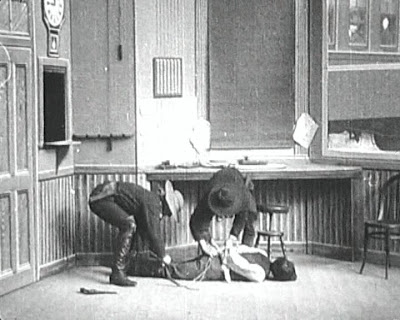“Professor” Wilson had suffered a series of strokes beginning on October 7th, 1919, that effectively paralyzed his left side and impaired his speech. The details were not shared with any of Wilson’s political advisors, and no one in his cabinet even knew what his affliction was or how serious. But the power vacuum was obvious to an ambitious man like Alexander Mitchell Palmer.
A congressman from Pennsylvania, and an unsuccessful candidate for the U.S. Senate, Palmer had only joined the administration in 1917 as the Alien Property Custodian, charged with seizing and disposing of German and Austro-Hungarian property after America joined the Allies in World War One. In fact the way this son of Quakers had dispensed the corporate properties was heavy with the stench of graft. When the post of Attorney General had become available, Palmer had pushed for the job. Wilson resisted, looking for A.B.P. – anyone but Palmer – until finally, as yet another sign of his political impotence, the President was forced to appoint a man he did not trust or respect. And almost immediately, the man began to run for the Presidency.
Palmer counted on his public “Red Scare” to be the flag around which conservatives would rally to support his candidacy, and carry him into the White House. He had already escaped assasination when an anarchist bomber blew himself up on the Attorney General's front porch. That photogenic escape had led to initial raids of Communists and anarchists in October of 1919 which had been widely approved of.
But the public reaction to the larger January raids had been largely negative. Emboldened by the criticism of the excesses, the Temporary (because this was yet another appointment Wilson no longer had the political power to secure) Under Secretary Of Labor, Louis Freeland Post, had cancelled most of the 4,000 arrest warrants Palmer and J. Edgar Hoover had issued, and most of the deportation orders for what Palmer called radicals, anarchists and communists. On examination, it seemed to Secretary Post, most of the arrests had been for simple union organizing.
Under Secretary Post (above) had even dared to call the warrants “illegal”.
Palmer’s supporter in these raids, J. Edgar Hoover, from the Justice Department’s Bureau of Investigation, had ratcheted up the fear by warning of a major communist uprising on the coming May Day, Saturday, May 1, 1920. And now Palmer had no choice but to wave the red flag himself. The week before the cabinet meeting, on Wednesday, April 7, 1920, Michigan had held its Democratic Party Primary. Palmer had finished dead last. It was now or never for Palmer, if he wanted to ride the red scare into the White House.Palmer began the cabinet meeting of May 14th, by demanding that the Secretary of Labor, his fellow Pennsylvanian, William B. Wilson (above), fire under Secretary Post. He called Post a “'moonstruck parlor radical”, and alleged that he had quashed the warrants simply because of “'his own personal view that the deportation law is wrong.”
But Secretary Wilson was one of the few original members of the administration, and knew the President, despite his stroke and his weakened power, still wanted a third term. Secretary Wilson's loyalities still lay with President Wilson, and so he had no intention of helping propel Palmer toward the White House. Secretary Wilson defended his man, Post.
President Wilson made no comment on the argument, in part because he was simply not comfortable enough yet with his diction, and the meeting moved onto other items. But as the meeting wrapped up, President Wilson told Palmer that he should “not let this country see Red.”
This left Palmer with little choice. He pushed his supporters in Congress to impeach Post, and soon; charging that he was soft on Communism. So as April ended the Senate Rules Committee opened hearings on whether Louis Freeland Post should be impeached. Meanwhile Palmer continued his drum beat of warnings about the imminent threat of a Communist May Day uprising. ''Like a prairie-fire, the blaze of revolution was sweeping over every American institution of law and order…eating its way into the homes of the American workmen, its sharp tongues of revolutionary heat were licking the altars of the churches, leaping into the belfry of the school bell, crawling into the sacred corners of American homes, seeking to replace marriage vows with libertine laws, burning up the foundations of society.''
The Newspaper headlines were clear; “: "Terror Reign by Radicals, says Palmer” Another newspaper screamed from its front page, “"Nation-wide Uprising on Saturday.”
On Thrusday, April 29, 1920, Attorney General Palmer claimed he had a list of “marked men” destined for assasination on Saturday by the communists. New York City put their entire 11,000 man police force on duty for that Saturday. In Boston the police stationed flying squads, with machine guns mounted on their cars, like fire fighters, in lower class neighborhoods, ready to handle any outbreak of violence before it could spread.
No such outbreaks occurred. In fact, it was one of the most peaceful May Days in decades. And Palmer and Hoover looked like complete fools.
- 30 -































































































